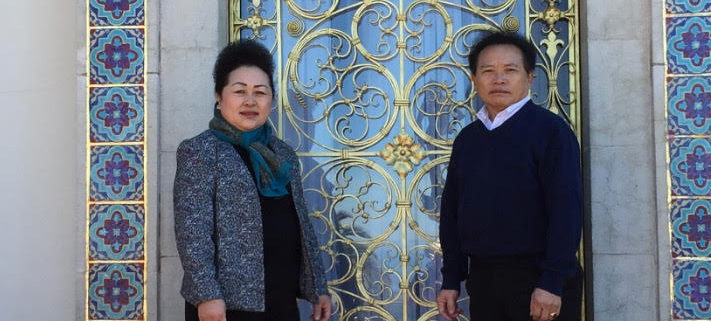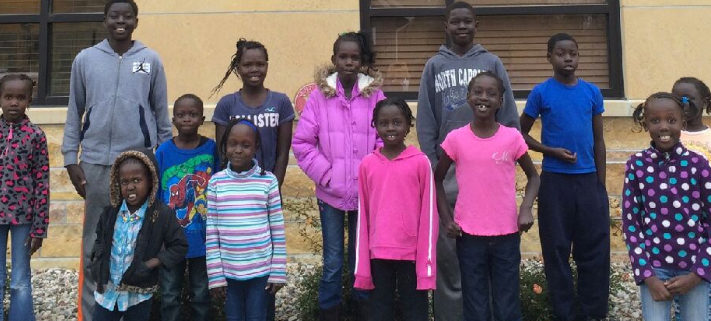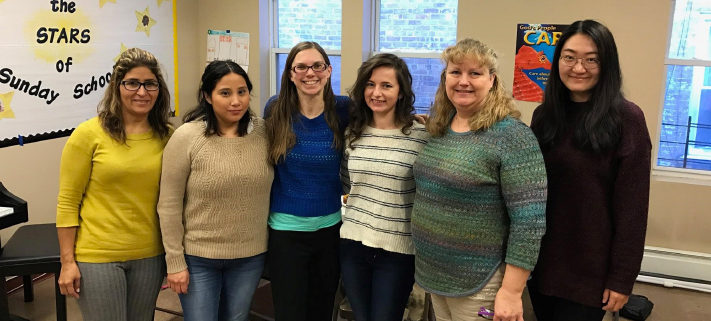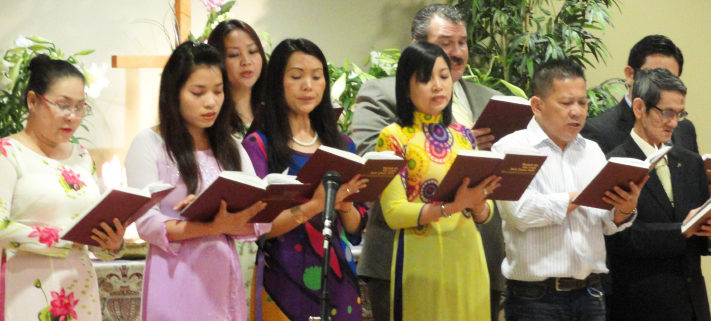Sharing the power of God’s grace with the Hmong
Julie K. Wietzke and Joel B. Schroeder
Passionate about reaching the Hmong
Julie K. Wietzke
Tong Xing Yang, one of the newest WELS Hmong pastors, is passionate about sharing the gospel with his fellow Hmong—so passionate that he began a rigorous Pastoral Studies Institute program, graduating at the age of 59.
“My wife and I believe that life on earth is too short, and if we do not know Christ, our lives would not have much purpose,” he says. “I have chosen to become a pastor specifically in order to share the power of God’s grace so that others who may not know or serve God will be saved.”
For more than 30 years, WELS has been sharing the gospel with Hmong immigrants in the United States. This includes training many Hmong men to be pastors and helping support them in their ministry. Some of these men serve congregations here in the United States, while others have returned to share the gospel in their home countries of Thailand and its surrounding area. A Global Hmong Ministry Committee was developed in 2015 to coordinate the ministry opportunities. Hmong pastor Bounkeo Lor recently accepted the call to serve as the Hmong Asia ministry coordinator.
A look at several U.S. Hmong ministries shows the challenges and blessings of reaching out to the Hmong.
New opportunities
With family, or clan, connections being strong in the Hmong culture, Yang and his wife moved to Fresno, Calif., after he graduated from the PSI program in 2013 to continue sharing the gospel with their seven children and their families. It was also a good area for evangelism with 75 percent of the Hmong population there not truly ’s grace.
Yang used his many personal and professional contacts in the Hmong community as opportunities to share God’s message; he also went door-to-door in Hmong neighborhoods. A radio broadcast further widened his outreach. Four years later, Faith Hmong has 93 members and 11 prospects—though the road has not been easy.
“Many Hmong believe that Shamanism is Hmong culture, so when I share God’s message, I am treated as a stranger because I am sharing a religion or culture that is not ‘Hmong,’ ” he says. “Oftentimes, I am challenged, left feeling ashamed, because I have been told that I am not Hmong . . . because I believe in the ‘white man’s religion.’ ”
This, however, doesn’t stop Yang. “My goal is to continue to share the gospel with the Hmong community,” he says. “I hope that God will help grow the seeds that I have tried to plant.”
Growing faith
Pheng Moua, pastor at Immanuel Hmong, St. Paul, Minn., shares Yang’s passion for reaching the lost. While Moua and his 250-member congregation continue to reach out to the largest Hmong population in the U.S., he is also working to make his congregation more independent and self-supporting.
Moua says he has seen much growth in his members’ faith since the congregation started as an exploratory mission in 1999. “A second generation of WELS Hmong Christians have emerged from the older generation that used to worship spirits and ancestors,” he says. “The young men and women whom the Lord brought to Immanuel’s congregation when they were in grade school are now teaching our WELS doctrines to the members and community.”
Currently worshiping at the Anglo congregation, St. John, St. Paul, Minn., Immanuel Hmong would like to secure its own church facility. “If we do not have a place for ourself, it is hard for us to do outreach to the community, and it is hard for our members to take responsibility and ownership,” says Moua. The church has put a building and a fundraising committee in place to work toward that goal.
Moua says Immanuel Hmong hopes to serve as a mother church for future Hmong congregations in the area as well as to partner with neighboring WELS congregations to train Hmong men for the ministry. It is also looking to add English worship services to reach the younger Hmong generation.
Close partnerships
Many Hmong ministries partner closely with an Anglo WELS congregation.
Holy Trinity, New Hope, Minn., found itself in this situation when Bounkeo Lor, then pastor at Grace Hmong, Kansas City, Kan., referred La Xiong to the congregation. Xiong and his extended family went through Bible information class and soon began members at Holy Trinity. Now Xiong is working with Dennis Klatt, pastor at Holy Trinity, and the Pastoral Studies Institute to become a pastor. “I love God and would like to help
others understand the love of Jesus from the gospel,” he says. “I want them to share heaven with me.”
Xiong offers monthly worship in Hmong at Holy Trinity as well as weekly adult Bible study. Besides his studies and his full-time job to support his family, he also is reaching out in his neighborhood and workplace. “I am currently helping a neighbor with landscaping in his yard and have had four conversations with him about Jesus,” he says. He also witnesses to his wife’s grandmother in Menomonie, Wis. “My goal is to get the family elder and his children connected to our WELS church there.”
Because he doesn’t speak English fluently, he is thankful for Holy Trinity’s partnership in reaching out to the second- and third-generation English-speaking Hmong. His and his extended family’s children attend Holy Trinity’s English Sunday school, and the entire group attends the English worship services held every week.
His goal once he becomes a pastor? “I would like to go back to Asia to share the gospel in Thailand and Laos. I would like to help them correctly understand the truth about God’s free and full forgiveness in Jesus.”
Julie Wietzke is managing editor of Forward in Christ.
Partners in the ministry
Joel B. Schroeder
Mt. Olive, Overland Park, Kan., has benefited greatly from associating with and serving Grace Hmong, Kansas City, Kan., 20 minutes northwest of us.
In 2015 we helped Grace Hmong secure a WELS Church Extension Fund loan to purchase and renovate the building they were leasing from a Lutheran Church–Missouri Synod congregation. We guided them through construction then helped them secure a grant to equip that building. Other grants purchased equipment to carry on weekly Internet radio outreach. We’ve included Grace Hmong in our annual budget. We’ve helped fund Pastor Bounkeo Lor’s frequent mission/training trips to Southeast Asia. We’ve helped buy Hmong Bibles and other printed materials he delivered to people begging for Bibles and the gospel. We’ve prayed for and encouraged Grace Hmong. Our pastors preach once a month to Hmong youth to keep them in the saving faith as they become more Americanized. Our pastors helped teach six men in the Pastoral Studies Institute.
Blessings haven’t flowed only one way. We’ve been privileged to see the passion of the Hmong people to hear and spread tirelessly the gospel. We’ve rejoiced when Pastor Lor’s trips overseas uncovered thousands of people begging for more gospel training. We are learning about another culture firsthand—delicious food, unique holidays, bright festival clothing, strong leadership by elders, and respect for the aged.
Grace Hmong has heightened our joy and burden to take the gospel to all nations. World mission opportunities exist down the block or at the next desk. We thank God for helping us see foreign fields near and far white unto harvest through our fellowship with Grace Hmong.
Joel Schroeder is pastor at Mt. Olive, Overland Park, Kansas.
This is the fourth article in a series about cross-cultural outreach in the U.S. and Canada.
SUBMIT YOUR STORY
Do you have a manuscript, idea, or story from your own life you’d like to share for use in Forward in Christ or on wels.net? Use our online form to share it to our editorial office for consideration.
SUBSCRIBE TO FORWARD IN CHRIST
Get inspirational stories, spiritual help, and synod news from Forward in Christ every month. Print and digital subscriptions are available from Northwestern Publishing House.
Author: Joel Schroeder and Julie Wietzke
Volume 104, Number 8
Issue: August 2017
Copyrighted by WELS Forward in Christ © 2021
Forward in Christ grants permission for any original article (not a reprint) to be printed for use in a WELS church, school, or organization, provided that it is distributed free and indicate Forward in Christ as the source. Images may not be reproduced except in the context of its article. Contact us




